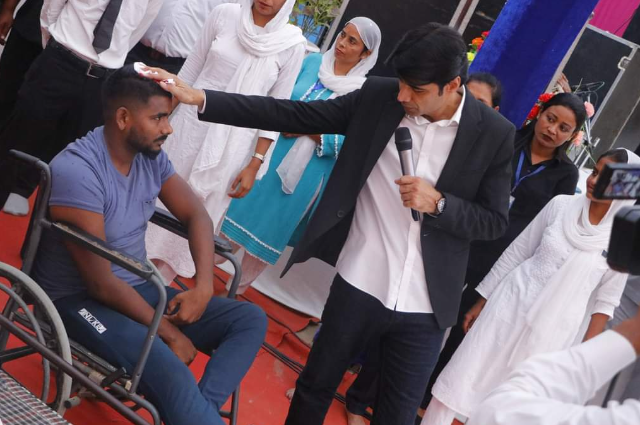In a significant legal development that has sent ripples across Punjab, Bajinder Singh, a self-proclaimed "prophet" whose ministry promised miraculous cures, has been sentenced to life imprisonment. This verdict given down by a local court in Sahibzada Ajit Singh Nagar on April 1, 2025, marks the culmination of a harrowing rape and sexual harassment case that originated in 2018.
The Rise and Fall of a Self-Styled Healer
Bajinder Singh, aged 42, operated the Glory and Wisdom Church with branches in Tajpur (Jalandhar) and Majri (Sahibzada Ajit Singh Nagar). His ministry centered on the claim of providing "miracle services," promising to alleviate various ailments and resolve life's problems. However, these claims frequently drew criticism and skepticism.
The Court's Decision: Justice Served
The Additional Sessions Court in Mohali delivered a decisive judgment, finding Bajinder Singh guilty of repeated rape. Specifically, he was convicted under Section 376(2)(n) of the Indian Penal Code, which addresses repeated rape of the same woman. This conviction led to the court's order that Singh serve imprisonment for the "remainder part of his life." Last week, the court had already established his guilt under Section 376 and other related sections. Notably, the other five individuals accused in connection with the case were acquitted.
The Victim's Testimony: A Chronicle of Betrayal
The victim's complaint painted a disturbing picture of abuse and manipulation. She alleged that her association with Bajinder Singh began in September 2017, and that he engaged in sexual activity with her without her consent. She further claimed that these acts were not isolated incidents but occurred repeatedly. Adding to the gravity of her accusations, she stated that she was made unconscious, during which time obscene videos of her were recorded. The woman asserted that the sexual assaults and exploitation had been ongoing since 2017.
Implications and Reflections
This case highlights the serious consequences of abusing positions of trust and authority. The court's decision underscores the legal system's commitment to holding perpetrators accountable, regardless of their public image or claims of divine influence. The verdict serves as a stark reminder of the importance of protecting vulnerable individuals and ensuring that justice is served for victims of sexual violence. This case will likely prompt further scrutiny of religious figures and organizations that claim to possess extraordinary powers, while also emphasizing the need for greater awareness and support for survivors of sexual assault.
The Importance of Strict Punishments in Sexual Assault Cases
Mr. Sagar emphasized that any leniency in such cases could have dangerous consequences. He pointed out that individuals who exploit their social status to prey on vulnerable people must be held accountable. Failure to impose strict punishments, he argued, would only encourage more predators and embolden them to commit such crimes without fear.
Singh’s Legal Response and Expected Appeal
Despite the court’s ruling, Singh’s legal team has remained silent on the matter. However, reports indicate that he is likely to challenge the verdict by filing an appeal in the high court. This move suggests that the legal battle surrounding the case is far from over.
Additional Allegations of Sexual Misconduct
The 2018 rape case is not the only accusation Singh faces. At least two other women have come forward with allegations of sexual assault against him. In February, a former disciple lodged a complaint, prompting authorities to initiate an investigation. Shortly after, the Punjab police registered another case against Singh, accusing him of sexually assaulting a woman following a prayer session. Singh has firmly denied these claims by maintaining his innocence.
Financial Investigations into Singh’s Churches
Apart from facing criminal charges, Singh's religious institutions have also been subjected to financial scrutiny. In January of the previous year, some of his churches were investigated by India's income-tax department. This development has further fueled the controversy surrounding him and his organization.
A Controversial Past: From Prison to Preacher
Singh's journey to becoming a religious figure has been unconventional. Born into a Hindu family in Haryana, he reportedly converted to Christianity about 15 years ago while serving time in prison. Media reports suggest that he was imprisoned in connection with a murder case, though he has never publicly addressed these claims.
On his personal website, Singh describes a troubled past, stating that "evil forces" led him into a life of crime before he discovered faith. He credits his transformation to receiving a Bible, which he claims guided him towards God. His website also refers to him as a "prophet" and promotes his services, which include healing people with holy oil and water.
A Polarizing Figure with Divided Public Opinion
Due to the numerous legal cases and controversies surrounding him, Singh has often been portrayed in the media as a divisive figure. However, his supporters continue to defend him, believing that he is being unfairly targeted. Singh himself has previously dismissed the negative press, attributing it to "schemes" and "plots" arranged by rival pastors.
The Road Ahead
With an appeal on the horizon and ongoing investigations, Singh's legal troubles are far from over. His case has sparked widespread debate on the accountability of religious leaders and the influence they wield. As the legal proceedings continue, many will be watching closely to see how justice unfolds in the coming months.
. . .
References:

